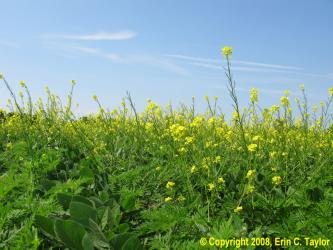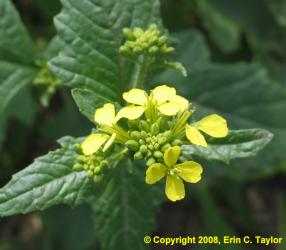Wild mustard


Wild mustard (Brassica kaber (D.C.) L.C. Wheeler)
Life Cycle:
Winter/summer annual. Emerges in late summer, early fall or spring. In Michigan, several populations of wild mustard act as a summer annual. Flowering peaks in June and July, but can continue until the first frost.
Emergence:
Emerges from soil depths of 1-inch or less.
Seed:
Production Range: Approximately 1,200 seeds per plant.
Dispersal Mechanisms: Seed pod dehiscence (splitting open).
Longevity: Low persistence - 50% of the seed bank is reduced in less than one year, and it takes seven years to reduce the seed bank 99%.
Dormancy: Initially dormant. Dormancy is broken by a combination of changes in temperature, light, and nitrate levels.
Competitiveness:
One of the more competitive weeds with small grains, soybean, and corn. Winter cereal yields were reduced 13 to 69%, when the biomass was comprised of 1 to 60% wild mustard. Soybean yields were reduced 46% with 4 plants per yard of row and corn yields were reduced 1.5- to 2-fold and 5- to 6-fold at low and high wild mustard densities, respectively.
Preferred Soil/Field Conditions:
Grows on a wide range of soils.
Management:
Biological
Predation/grazing: Ground beetles (carabids) eat wild mustard seed lying on the soil surface.
Decay: No information.
Mechanical
Tillage: Seedlings are readily killed by tillage.
Rotary Hoeing: Hoe before weeds exceed 1/4-inch in height, once established wild mustard is difficult to control.
Flaming: Effective on small wild mustard.
Cultural
Crop rotation: Corn-soybean rotations will deplete wild mustard populations more rapidly than continuous wheat.
Planting date: Later planting will reduce wild mustard populations.
Chemical
Application timing and effectiveness: Several herbicides are effective for controlling wild mustard. Control is greater when herbicides are applied to smaller wild mustard plants. Please refer to E-434, "MSU Weed Control Guide for Field Crops," for herbicide recommendations.
Additional Information
Wild mustard can serve as an alternate host of nematodes and many insect pests.



 Print
Print Email
Email